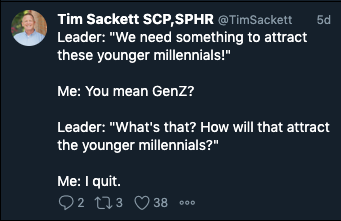From the front lines of in the weeds HR Management in Detroit – HR Manager claims to have been fired for whistleblowing on some unfair executive compensation practices!
From the front lines of real HR:
A human resources manager at the publicly-funded Great Lakes Water Authority has filed a whistleblower arbitration case against the agency, claiming she was fired only days after raising concerns about lucrative new retirement benefits for authority CEO Sue McCormick, and how they were handled.
The benefit netted McCormick, a former manager of the Detroit Water and Sewerage Department, more than $90,000 in additional retirement money in 2018 — an amount so large, it had to be split over two years to conform with Internal Revenue Service maximum retirement contributions by an employer.
Hmmm…sounds fishy…continue:
Though other GLWA employees also received the benefit — designed for former Detroit water department employees who left city employment to come to GLWA before becoming vested in the city’s pension system — McCormick’s bonus under the program was, by far, the largest, said Stephanie Stevenson, a human resources manager with the agency whose job included oversight of employee benefits…
…Stevenson said it seemed as if policies were being created specifically to assist McCormick with her predicament — and were being made without consulting Stevenson, who oversaw benefits.
“This was unfair. It was like an abuse of power — corrupt,” Stevenson said.
Rule number one in HR Fight Club – do not make a benefit change without first consulting the HR Pro in the house!
So, the GLWA decided to terminate HR Manager Stephanie. Did they terminate her because of the whistleblower complaint? “No!” was the exact quote from lawyers representing GLWA. Why was Stephanie fired? They weren’t saying…
Here’s the thing.
Almost every executive makes so much more than the run of the mill employee, and HR Manager, that when you see something like your initial impression is something isn’t right about this! Executive compensation is a different animal altogether!
Now, I don’t know if Stephanie was fired for whistleblowing. But, when you hear the explanation of the additional compensation benefit and its design, whether it was done specifically for the CEO or not, they dotted their i’s and crossed their t’s, and while most employees couldn’t take advantage of this additional benefit, all were eligible.
“Unfair” isn’t illegal and sometimes that’s is so hard to accept. Is it fair this CEO gets a bunch of money given to them when most employees will not be given anywhere near this amount? No. Is it illegal? Also, No.
If I was a betting man, Stephanie, got fired not for whistleblowing, but for probably some stuff she did to prove something illegal was going on, when it really wasn’t, but it felt like it was. Why don’t people come forward with whistleblowing complaints? Because either way, no one wants you around afterward. Rightly or wrongly, a trust has been broken. That’s not right, that’s reality. Funny enough, most HR pros actually know the math on this!
What I find most helpful when dealing with executive compensation stuff like this is to bring a few people into the decision-making process, and have us all together at the same time. I want someone from my legal team, someone from my HR team, and someone from my finance team, hopefully with their CPA. Are we legal, are we following tax laws, are we breaking policy we shouldn’t? Is everyone good? Okay, go.
Executives are hired and fired for making decisions above our pay grade. Sometimes they get benefits that seem unfair and exorbitant. The big question you need to ask, is this illegal or simply just unfair? Those are two very different things!

